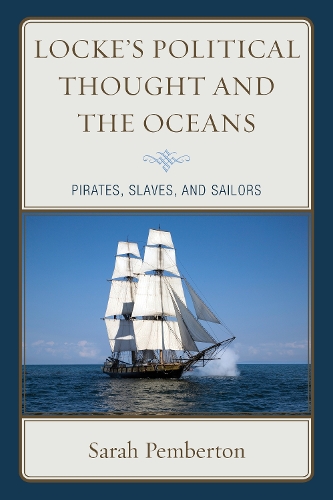
Locke's Political Thought and the Oceans: Pirates, Slaves, and Sailors
(Paperback)
Available Formats
Publishing Details
Locke's Political Thought and the Oceans: Pirates, Slaves, and Sailors
By (Author) Sarah Pemberton
Bloomsbury Publishing PLC
Lexington Books
11th February 2020
United States
Classifications
Professional and Scholarly
Non Fiction
Jurisprudence and general issues
Western philosophy: Enlightenment
320.5092
Physical Properties
Paperback
178
Width 155mm, Height 223mm, Spine 13mm
277g
Description
This book outlines and analyzes John Lockes political thought about the oceans with a focus on law and freedom at sea. The book examines the Two Treatises of Government, in which Locke argues that the seas are collectively owned by all humans and are governed by universal natural laws that prohibit piracy. Lockes Two Treatises provides a systematic political theory of the seas that contributes to theories of international law and maritime law, but his text does not answer the practical question of how to enforce law effectively at sea. The book also considers how Locke translated his theoretical ideas into practice when he was involved in policymaking as a member of Englands Board of Trade during the 1690s. On the Board, Locke waged a war against pirates by proposing an anti-piracy treaty between Europes major maritime states, by successfully advocating a new English piracy law, and by supporting the deployment of the English Navy against pirates. Lockes war against pirates was consistent with the natural law theory in the Two Treatises, and helped to build English empire on land and at sea. There is also consistency between Lockes theoretical views about slavery and his work on the Board of Trade. As a Board member, Locke advocated forced migration and forced labor for English convicts, which is consistent with the theory of penal slavery in the Two Treatises and suggests that his theory was intended to justify the enslavement of English convicts. However, there are tensions between Lockes arguments in the Two Treatises and the policies of forced naval service that he supported on the Board. Lockes theories of law and freedom at sea shaped his vision of English national identity, and influenced the English governments policies about slavery and piracy.
Reviews
Pemberton uses original archival research and historically informed secondary scholarship to produce an insightful study of the relationship between Lockes philosophically grounded writings on the origins of government and his role as adviser for imperial policy as a member of the Board of Trade. By examining the issues of piracy, penal slavery, and forced military service (especially naval impressment), she notes the tensions in Lockes commitment to representative government and liberty and his strong advocacy of colonial settlement in the Americas that required the accoutrements of imperial power. Intersecting this tension was the felt need to turn the unemployed poor into productive citizens, using inducements and coercion to people the colonies with the labor of indentured servants. Lockes agriculturalist theory of property, combined with his natural law theory of the commons, led to his defense of open seas and advocacy of international treaties to address issues of natural and domestic law jurisdictional conflicts. Lockes writings on the oceans echo today in discussions of piracy, the extension of national sovereignty far into the ocean beds, and the defense of open international waters. Summing Up: Recommended. Upper-division undergraduates through faculty. * CHOICE *
Pemberton has achieved a remarkable feat by bringing into focus a crucial yet largely neglected aspect of Lockes political thought. Drawing on Lockes unpublished writings and a rich trove of archival material, Pemberton complements the recent colonial interpretations of Locke in important ways. The books much welcome analysis of Lockes position on piracy, naval impressment, and convict transportation sheds fresh light on the contours and limits of his putative liberalism. Political theorists and intellectual historians will find in this book a provocative yet informed interpretation of Lockes ideas. -- Onur Ulas Ince, Singapore Management University
Sarah Pemberton's fascinating book tells the stories at the fringe of the emerging liberal economic and political order. By situating John Locke's theories in the chaos of the sea, Pemberton illuminates his attempts to solve the problems of conquest and disorder in a very pragmatic fashion. This book will provide rich theoretical frameworks for anyone interested in the origins of the political orders and disorders of our own time. -- Keally McBride, University of San Francisco
Author Bio
Sarah Pemberton is an independent scholar (PhD).
